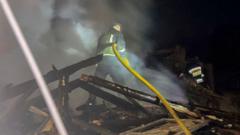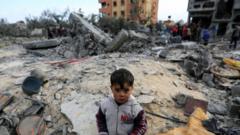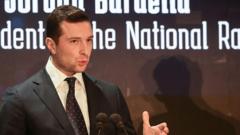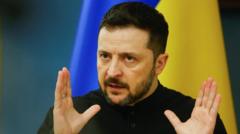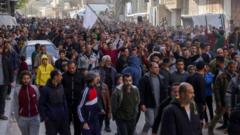Israel's strike comes in response to rocket fire and further complicates the already strained peace agreement, raising concerns over renewed conflict.
Israel Launches Airstrike on Beirut: Tensions Rise After Ceasefire Violation
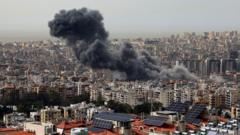
Israel Launches Airstrike on Beirut: Tensions Rise After Ceasefire Violation
Tensions escalate in Lebanon as Israel conducts an airstrike in Beirut’s southern suburbs, indicating a fragile ceasefire with Hezbollah.
Israel has executed its first airstrike in the southern suburbs of Beirut since the ceasefire with Hezbollah was established in November. The Israeli military reported hitting a drone storage facility belonging to Hezbollah on Friday, igniting panic among residents after an evacuation warning was issued. The strike followed a few hours after two rockets were launched from southern Lebanon toward northern Israel, with Israel intercepting one and the other failing to reach its target. Hezbollah denied any involvement in the rocket fire.
Israeli officials labeled the incident a "violation" of the ceasefire agreement, which is also acknowledged as such by Lebanese President Joseph Aoun's office. Aoun, currently in Paris for discussions, notified President Emmanuel Macron of France, along with the leaders of Cyprus and Greece, regarding the strike and declared it a breach of the agreement, which was supported by both France and the U.S.
The IDF asserted that the recent rocket attack constituted a clear infringement on the understandings between Israel and Lebanon, presenting a direct threat to Israeli civilians. As a result of the escalating conflict, Lebanese authorities face mounting challenges in maintaining control over southern regions, historically impacted by militant activities, particularly those of Hezbollah, Hamas, and Islamic Jihad.
Notably, despite the ceasefire, Israel has continuously conducted airstrikes, targeting suspected Hezbollah-linked sites to prevent rearmament. Lebanon's government has countered that these strikes, alongside the presence of Israeli troops in southern Lebanon, violate the ceasefire.
Friday's incident marks the second assault from Lebanon within a week, illustrating a precarious peace situation following an extended period of conflict that led to significant casualties and displacement earlier this year. In the aftermath of the continuing violence, it remains to be seen whether the current ceasefire will withstand these provocations or if further hostilities are imminent.
Israeli officials labeled the incident a "violation" of the ceasefire agreement, which is also acknowledged as such by Lebanese President Joseph Aoun's office. Aoun, currently in Paris for discussions, notified President Emmanuel Macron of France, along with the leaders of Cyprus and Greece, regarding the strike and declared it a breach of the agreement, which was supported by both France and the U.S.
The IDF asserted that the recent rocket attack constituted a clear infringement on the understandings between Israel and Lebanon, presenting a direct threat to Israeli civilians. As a result of the escalating conflict, Lebanese authorities face mounting challenges in maintaining control over southern regions, historically impacted by militant activities, particularly those of Hezbollah, Hamas, and Islamic Jihad.
Notably, despite the ceasefire, Israel has continuously conducted airstrikes, targeting suspected Hezbollah-linked sites to prevent rearmament. Lebanon's government has countered that these strikes, alongside the presence of Israeli troops in southern Lebanon, violate the ceasefire.
Friday's incident marks the second assault from Lebanon within a week, illustrating a precarious peace situation following an extended period of conflict that led to significant casualties and displacement earlier this year. In the aftermath of the continuing violence, it remains to be seen whether the current ceasefire will withstand these provocations or if further hostilities are imminent.







